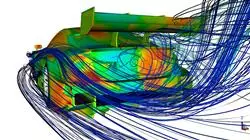University certificate
The world's largest faculty of engineering”
Introduction to the Program
Become an expert in Computational Fluid Mechanics Techniques in just a few months"

Within Simulation we find different computer techniques such as Computational Fluid Dynamics, which has become very important nowadays due to its multiple advantages, such as the level of detail it provides, the time saving or the cost reduction. Its different procedures simulate by means of numerical methods the real behavior of the fluids, with the objective of obtaining more information and understanding of the same. Therefore, they are applicable in multiple areas such as aerospace, automotive, environment, biomedicine or wind energy.
To get the most out of these techniques, advanced knowledge is required, which is increasingly in demand in the labor market, which is why TECH has designed a Postgraduate diploma in CFD Techniques. This program aims to provide students with a good specialized base in the different numerical methods of CFD, so that they can face their work in this field, with the highest quality in their work.
In this way, content has been created that delves into Fluid Mechanics, High Performance Computing, Advanced Mathematics for CFD, Finite Volume Methods and Advanced Methods for CFD, among other relevant topics.
All this through a 100% online content that gives the student total freedom to organize their studies and schedules as best suits them, being able to combine the completion of the program with their other daily activities. In addition, the student will be provided with dynamic multimedia materials, practical exercises, fully updated information and the latest teaching technologies.
Delve into essential CFD Techniques and master an area with brilliant job potential"
This Postgraduate diploma in CFD Techniques contains the most complete and up-to-date program on the market. The most important features include:
- The development of case studies presented by experts in CFD Techniques
- The graphic, schematic, and practical contents with which they are created, provide scientific and practical information on the disciplines that are essential for professional practice
- Practical exercises where self-assessment can be used to improve learning
- Its special emphasis on innovative methodologies
- Theoretical lessons, questions to the expert, debate forums on controversial topics, and individual reflection assignments
- Content that is accessible from any fixed or portable device with an Internet connection
Acquire new knowledge and improved skills in Finite Element Methods or Smoothed Particle Hydrodynamics"
The program’s teaching staff includes professionals from sector who contribute their work experience to this educational program, as well as renowned specialists from leading societies and prestigious universities.
Its multimedia content, developed with the latest educational technology, will provide the professional with situated and contextual learning, i.e., a simulated environment that will provide an immersive education programmed to learn in real situations.
The design of this program focuses on Problem-Based Learning, by means of which the professional must try to solve the different professional practice situations that are presented throughout the academic course. For this purpose, the student will be assisted by an innovative interactive video system created by renowned experts.
Enroll now and get access to all SPH-based Simulator Development content"

Enjoy the best theoretical and practical content in Advanced Methods for CFD"
Why study at TECH?
TECH is the world’s largest online university. With an impressive catalog of more than 14,000 university programs available in 11 languages, it is positioned as a leader in employability, with a 99% job placement rate. In addition, it relies on an enormous faculty of more than 6,000 professors of the highest international renown.

Study at the world's largest online university and guarantee your professional success. The future starts at TECH”
The world’s best online university according to FORBES
The prestigious Forbes magazine, specialized in business and finance, has highlighted TECH as “the world's best online university” This is what they have recently stated in an article in their digital edition in which they echo the success story of this institution, “thanks to the academic offer it provides, the selection of its teaching staff, and an innovative learning method aimed at educating the professionals of the future”
A revolutionary study method, a cutting-edge faculty and a practical focus: the key to TECH's success.
The most complete study plans on the university scene
TECH offers the most complete study plans on the university scene, with syllabuses that cover fundamental concepts and, at the same time, the main scientific advances in their specific scientific areas. In addition, these programs are continuously being updated to guarantee students the academic vanguard and the most in-demand professional skills. In this way, the university's qualifications provide its graduates with a significant advantage to propel their careers to success.
TECH offers the most comprehensive and intensive study plans on the current university scene.
A world-class teaching staff
TECH's teaching staff is made up of more than 6,000 professors with the highest international recognition. Professors, researchers and top executives of multinational companies, including Isaiah Covington, performance coach of the Boston Celtics; Magda Romanska, principal investigator at Harvard MetaLAB; Ignacio Wistumba, chairman of the department of translational molecular pathology at MD Anderson Cancer Center; and D.W. Pine, creative director of TIME magazine, among others.
Internationally renowned experts, specialized in different branches of Health, Technology, Communication and Business, form part of the TECH faculty.
A unique learning method
TECH is the first university to use Relearning in all its programs. It is the best online learning methodology, accredited with international teaching quality certifications, provided by prestigious educational agencies. In addition, this disruptive educational model is complemented with the “Case Method”, thereby setting up a unique online teaching strategy. Innovative teaching resources are also implemented, including detailed videos, infographics and interactive summaries.
TECH combines Relearning and the Case Method in all its university programs to guarantee excellent theoretical and practical learning, studying whenever and wherever you want.
The world's largest online university
TECH is the world’s largest online university. We are the largest educational institution, with the best and widest online educational catalog, one hundred percent online and covering the vast majority of areas of knowledge. We offer a large selection of our own degrees and accredited online undergraduate and postgraduate degrees. In total, more than 14,000 university degrees, in eleven different languages, make us the largest educational largest in the world.
TECH has the world's most extensive catalog of academic and official programs, available in more than 11 languages.
Google Premier Partner
The American technology giant has awarded TECH the Google Google Premier Partner badge. This award, which is only available to 3% of the world's companies, highlights the efficient, flexible and tailored experience that this university provides to students. The recognition as a Google Premier Partner not only accredits the maximum rigor, performance and investment in TECH's digital infrastructures, but also places this university as one of the world's leading technology companies.
Google has positioned TECH in the top 3% of the world's most important technology companies by awarding it its Google Premier Partner badge.
The official online university of the NBA
TECH is the official online university of the NBA. Thanks to our agreement with the biggest league in basketball, we offer our students exclusive university programs, as well as a wide variety of educational resources focused on the business of the league and other areas of the sports industry. Each program is made up of a uniquely designed syllabus and features exceptional guest hosts: professionals with a distinguished sports background who will offer their expertise on the most relevant topics.
TECH has been selected by the NBA, the world's top basketball league, as its official online university.
The top-rated university by its students
Students have positioned TECH as the world's top-rated university on the main review websites, with a highest rating of 4.9 out of 5, obtained from more than 1,000 reviews. These results consolidate TECH as the benchmark university institution at an international level, reflecting the excellence and positive impact of its educational model.” reflecting the excellence and positive impact of its educational model.”
TECH is the world’s top-rated university by its students.
Leaders in employability
TECH has managed to become the leading university in employability. 99% of its students obtain jobs in the academic field they have studied, within one year of completing any of the university's programs. A similar number achieve immediate career enhancement. All this thanks to a study methodology that bases its effectiveness on the acquisition of practical skills, which are absolutely necessary for professional development.
99% of TECH graduates find a job within a year of completing their studies.
Postgraduate Diploma in CFD Techniques
If you are an engineer, you are passionate about computational fluid dynamics and you want to develop your career in this area, you can do it thanks to the Postgraduate Diploma in CFD Techniques from TECH Global University. This way you will expand your knowledge and skills in the field of CFD techniques completely online. Computational fluid dynamics is a discipline in constant evolution, and with our study program you will be able to keep up to date with the latest trends and technologies in the field. In addition, our team of highly qualified professionals will guide you through every step of the process, from theory to practice, and help you develop the skills you need to meet any challenges that arise in your career. Our curriculum is designed so that you can study online, from anywhere in the world, and at your own pace. This allows you to combine improving your resume with your work and personal responsibilities. In addition, our course material is designed to be easy to understand and apply in real life.
Get trained in computational fluid dynamics online
TECH Global University's Postgraduate Diploma in CFD Techniques focuses on the practical aspects of numerical fluid simulation and the application of CFD techniques in industry. You will learn to use the most advanced tools on the market, such as ANSYS Fluent, and to apply them in different sectors, such as aeronautics, automotive, energy and construction. At the end of the program, you will be able to design, model and simulate complex fluid problems with the most advanced CFD techniques on the market. This will allow you to excel in your work and be at the forefront in your field of specialization. In short, if you are an engineer with a passion for computational fluid dynamics and wish to expand your knowledge and skills, our Postgraduate Diploma in CFD Techniques is the ideal option for you. Study online, at your own pace, and become an expert in the most advanced CFD techniques on the market - enroll today!







